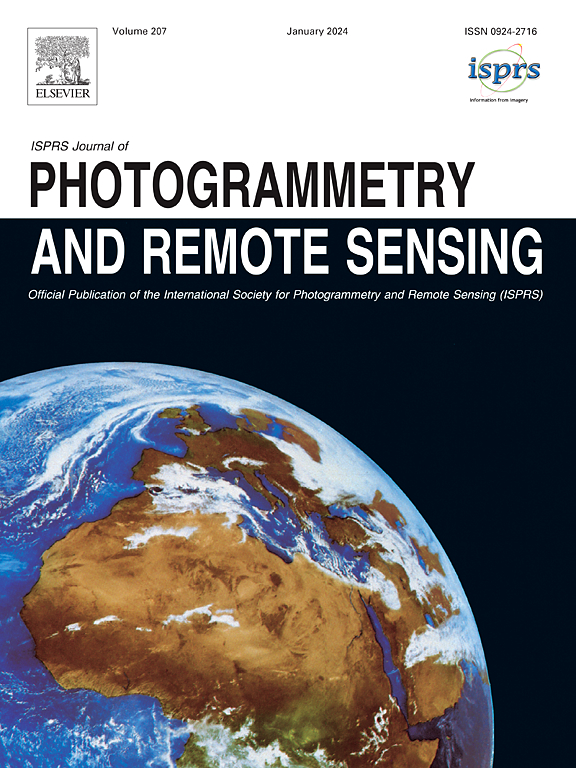用于稳健图像匹配的统一特征-运动一致性框架
IF 10.6
1区 地球科学
Q1 GEOGRAPHY, PHYSICAL
ISPRS Journal of Photogrammetry and Remote Sensing
Pub Date : 2024-09-25
DOI:10.1016/j.isprsjprs.2024.09.021
引用次数: 0
摘要
在各种情况下,在一对图像之间建立可靠的特征匹配是摄影测量中一个长期存在的难题。基于注意力的无检测器粗到细结构匹配一直是建立匹配的典型方法,但具有全局感受野的交叉注意力模块可能会引入无关区域(异常值),从而影响结构的局部一致性。运动场可以保持结构上的局部一致性,前提是相邻特征的匹配应在空间上接近。然而,运动场只能估计连续图像之间的局部位移,在没有空间相关性先验的大规模变化情况下,难以估计长距离位移。此外,大尺度变化还可能破坏补丁级匹配中应用的互为近邻准则的几何一致性,从而难以恢复准确的匹配。在本文中,我们提出了用于鲁棒图像匹配的统一特征-运动一致性框架(MOMA),以在尺度差异场景中保持全局和局部粒度的结构一致性。MOMA 在交叉注意中设计了一种以运动一致性为指导的依赖范围策略(MDR),将运动共识限制邻域内的高度相关区域聚合起来,以偏向于真正的可匹配区域。同时,建立了一个具有分层注意结构的统一框架,将局部运动场与全局特征对应关系结合起来。运动场为特征聚合提供局部一致性约束,而特征对应则为改进运动场估计提供空间上下文先验。为了缓解硬性近邻标准造成的几何不一致性,我们提出了一种自适应邻域搜索(软性)策略来解决尺度差异问题。在三个数据集上进行的广泛实验表明,我们的方法优于固体基线,在 Megadepth 测试中,当阈值为 5°/10°/20° 时,双视角姿势估计任务的 AUC 提高了 4.73/4.02/3.34;在 HPatches 数据集上,当阈值为 1px 时,同构任务的准确率提高了 5.94%。此外,在三维测绘等下游任务中,使用我们的方法在自收集的 SYSU 无人机数据集上重建的三维模型在结构完整性和细节丰富度方面都有显著提高,这表明它在广泛的下游任务中具有很高的适用性。代码可在 https://github.com/BunnyanChou/MOMA 上公开获取。本文章由计算机程序翻译,如有差异,请以英文原文为准。
A unified feature-motion consistency framework for robust image matching
Establishing reliable feature matches between a pair of images in various scenarios is a long-standing open problem in photogrammetry. Attention-based detector-free matching with coarse-to-fine architecture has been a typical pipeline to build matches, but the cross-attention module with global receptive field may compromise the structural local consistency by introducing irrelevant regions (outliers). Motion field can maintain structural local consistency under the assumption that matches for adjacent features should be spatially proximate. However, motion field can only estimate local displacements between consecutive images and struggle with long-range displacements estimation in large-scale variation scenarios without spatial correlation priors. Moreover, large-scale variations may also disrupt the geometric consistency with the application of mutual nearest neighbor criterion in patch-level matching, making it difficult to recover accurate matches. In this paper, we propose a unified feature-motion consistency framework for robust image matching (MOMA), to maintain structural consistency at both global and local granularity in scale-discrepancy scenarios. MOMA devises a motion consistency-guided dependency range strategy (MDR) in cross attention, aggregating highly relevant regions within the motion consensus-restricted neighborhood to favor true matchable regions. Meanwhile, a unified framework with hierarchical attention structure is established to couple local motion field with global feature correspondence. The motion field provides local consistency constraints in feature aggregation, while feature correspondence provides spatial context prior to improve motion field estimation. To alleviate geometric inconsistency caused by hard nearest neighbor criterion, we propose an adaptive neighbor search (soft) strategy to address scale discrepancy. Extensive experiments on three datasets demonstrate that our method outperforms solid baselines, with AUC improvements of 4.73/4.02/3.34 in two-view pose estimation task at thresholds of 5°/10°/20° on Megadepth test, and 5.94% increase of accuracy at threshold of 1px in homography task on HPatches datasets. Furthermore, in the downstream tasks such as 3D mapping, the 3D models reconstructed using our method on the self-collected SYSU UAV datasets exhibit significant improvement in structural completeness and detail richness, manifesting its high applicability in wide downstream tasks. The code is publicly available at https://github.com/BunnyanChou/MOMA.
求助全文
通过发布文献求助,成功后即可免费获取论文全文。
去求助
来源期刊

ISPRS Journal of Photogrammetry and Remote Sensing
工程技术-成像科学与照相技术
CiteScore
21.00
自引率
6.30%
发文量
273
审稿时长
40 days
期刊介绍:
The ISPRS Journal of Photogrammetry and Remote Sensing (P&RS) serves as the official journal of the International Society for Photogrammetry and Remote Sensing (ISPRS). It acts as a platform for scientists and professionals worldwide who are involved in various disciplines that utilize photogrammetry, remote sensing, spatial information systems, computer vision, and related fields. The journal aims to facilitate communication and dissemination of advancements in these disciplines, while also acting as a comprehensive source of reference and archive.
P&RS endeavors to publish high-quality, peer-reviewed research papers that are preferably original and have not been published before. These papers can cover scientific/research, technological development, or application/practical aspects. Additionally, the journal welcomes papers that are based on presentations from ISPRS meetings, as long as they are considered significant contributions to the aforementioned fields.
In particular, P&RS encourages the submission of papers that are of broad scientific interest, showcase innovative applications (especially in emerging fields), have an interdisciplinary focus, discuss topics that have received limited attention in P&RS or related journals, or explore new directions in scientific or professional realms. It is preferred that theoretical papers include practical applications, while papers focusing on systems and applications should include a theoretical background.
 求助内容:
求助内容: 应助结果提醒方式:
应助结果提醒方式:


